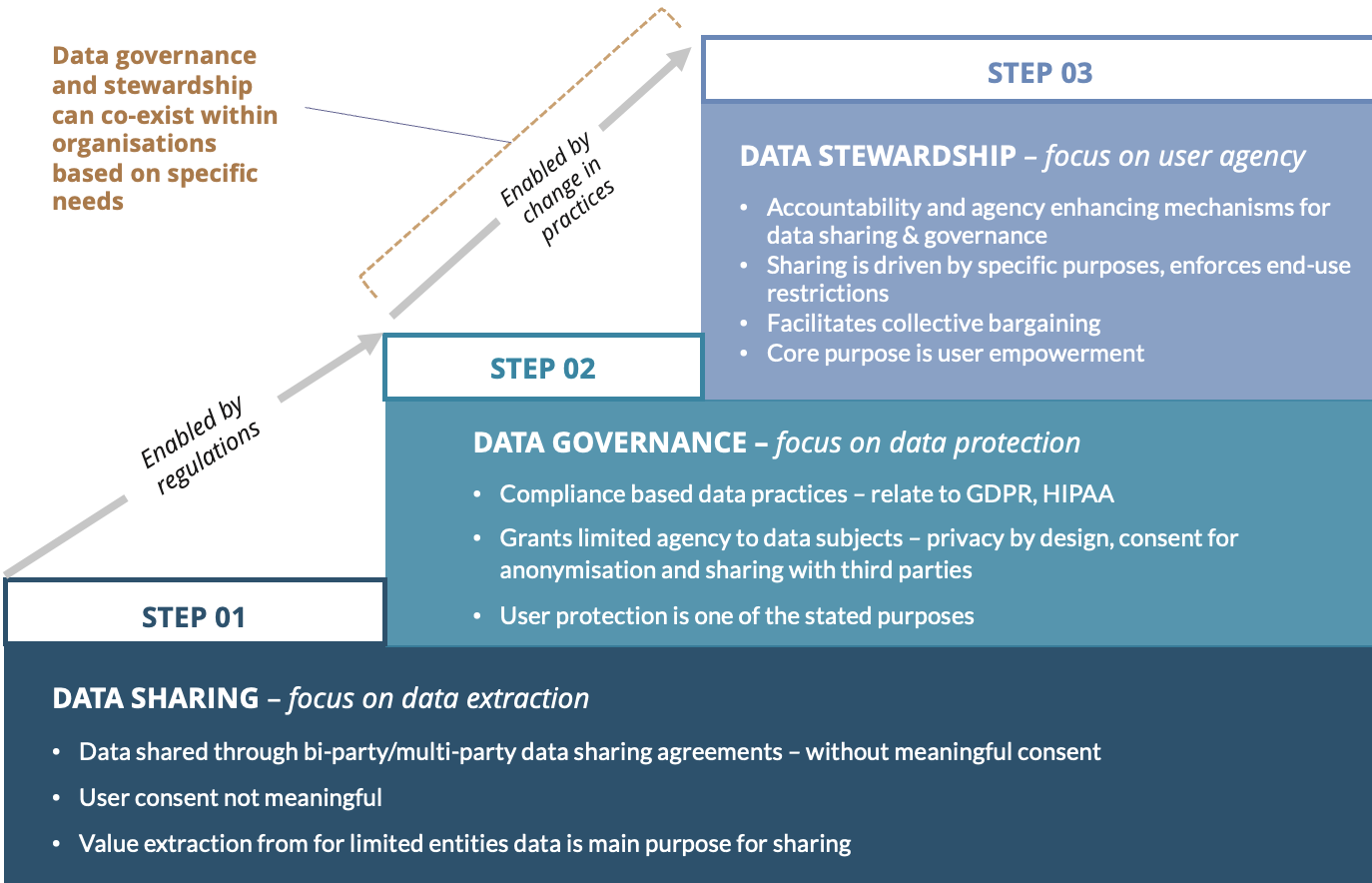July 6th, 2022
In February, the Data Economy Lab set out to understand the vast landscape of data gathering and governing efforts in the environmental conservation and sustainable development space. We have aimed to identify the key stakeholders (policymakers, stewards/steward-like initiatives, funders and research institutes) in the space, diagnose their key challenges and explore their needs.
The following blog highlights the role and possible responsibilities we see civil society organisations playing in the broader stewardship ecosystem. It does so by exploring a set of assumptions that position civil society organisations as ‘viable’ stewards, particularly in the domain of environmental conservation and sustainable development. It goes on to share our emerging findings of how these entities roughly fit into a set of categories — where each raises a different set of questions and has varying demands. These findings urge a more nuanced approach for those in the ecosystem looking to accelerate the uptake of stewardship.
A recap of our early mapping
We found a range of efforts to collate environmental/ecological data archives or repositories (e.g Environmental Data Initiative’s Data Portal), participatory or citizen-science-oriented data collection initiatives (e.g WaterCAN) emerging networks (e.g Environmental Data & Governance Initiative and echo Network) that aim to harmonise and make environmental data openly accessible. Efforts to render traditional and indigenous knowledge, practices and interwoven histories (e.g Kalahari San Master Tracker Programme and Keeping Culture) digital platforms were also found to be spearheaded by regional coalitions, non-profits and international institutes.
Through our research and conversations, we recognized that many of these initiatives are also led or supported by Civil Society Organisations (CSOs). CSOs engaged in environmental justice efforts are now keenly recognizing the adjacencies to data justice — an evolving field of discourse that makes explicit the systematic injustices that data-led and digital technologies can maintain or exacerbate. Similarly, those invested in building locally-led adaptation-based solutions are beginning to explore how principles of offline participation, inclusion and accountability may translate in digital contexts.
This evolving trajectory finds resonance in the field of data stewardship. Data Stewardship is a paradigm which explores how the societal value of data can be unlocked while considering what it takes to empower individuals/communities to better negotiate their data rights.
Are CSOs best placed to steward environmental and ecological data?

Employing the lens of stewardship in the environmental and ecological data ecosystem, resulted in more closely analysing the role that civil society and community-based organisations can play in stewarding or supporting steward-like initiatives in thriving. In a previous piece, we explored how CSOs are well-suited to act as bulwarks against data extractivism and may play a central role in building a more equitable data landscape.
This thinking was guided by several core assumptions; first, an active and diverse civil society is considered a key pillar of democracy. CSOs are not only capable of ‘calling out’ or holding other stakeholders accountable but are increasingly playing a fundamental role in bridging relations between community, public and private sectors. Most recently, CDP, a global non-profit that describes itself as the “gold standard of environmental reporting with the richest and most comprehensive dataset on corporate and city action”, pioneered a ‘Non-Disclosure Campaign’ to engage and incentivize the planet’s highest impact companies (read: polluters) to disclose environmental data that relates to climate change, water and forest security. While their campaign and engagement resulted in 60% greater participation and transparency from some companies, it also shone a spotlight on those that have yet to comply — a list that expectedly names Exxon Mobil and Saudi Aramco, but more surprisingly also includes Tesla. These inter-stakeholder efforts are necessary as siloed environmental data impedes our visibility around the impact of these industries on the climate and hinders the ability to mitigate these risks through interventions and regulation.
Second, existing community-based infrastructures (for e.g self-help groups, unions, cooperatives) can play a crucial role in mobilising communities around data and identifying ‘data priorities’ — existing relationships of trust may position these entities as viable ‘stewards’. Further, grassroots and community organisations may already possess structures for individuals/communities to be meaningfully represented or actively participate and make decisions. These mechanisms are foundational to stewardship and if harnessed, will not require creating these processes from scratch.
Digital Democracy, a civil society organisation that co-built a free digital toolset for earth defenders called Mapeo for documenting and monitoring, operates along these principles. Their technology is employed directly by communities as well as by partner organisations and enables them to document, own and share data on human rights conditions and land practices in ways that reflect their interests and outcomes.

Third, CSOs may possess an existing duty of care, loyalty and imperative to minimize harm toward their beneficiaries — an extension of these responsibilities toward safeguarding rights in the digital realm is possible. Most recently an updated playbook was released in partnership with the International Federation of Red Cross & Red Crescent Network to support organisations to embed data protection and responsible data use across the data journey and value chain. Similarly, Data.org’s ‘data maturity assessment tool’ guides social impact organisations on how to best leverage the value of data for impact. These efforts are foundational to fortifying civil society’s capacities to better protect and uphold digital rights.
Lastly, many CSOs already engage in capacity building and skills around technical and financial literacy — it is possible that these frameworks can similarly be employed to generate awareness on data rights and literacy. Organisations like Body & Data operate in this nexus and carry out critical work in advocating for feminist-oriented digital rights and awareness.
If these assertions are valid, it stands to reason that civil society organisations will continue to require support from the ecosystem to effectively play the role of a steward.
Unravelling the stewardship spectrum — categorising CSOs

To get a pulse for how stewardship is perceived and what organisations’ core needs are, we classified our conversations and the key questions that CSOs raised into the following categories:
- Early-stage stewards/steward-like initiatives
- Mid-stage stewards/steward-like initiatives
- Supportive/Ecosystem Enabler organisations.
The first two categories can be best described by referring to the data stewardship ladder illustrated in the figure below:
Figure 1: The Data Stewardship Ladder

Type 1: Early-stage stewards are characterised as being relatively nascent in their digital journeys and depending on the regulatory frameworks (or lack thereof) that pertain to their jurisdiction, may be newly contending with questions of data governance (consent, privacy, safeguards, risks). This positions most of these organisations in Step 01 or in between Step 01 and Step 02. These early-stage stewards may be at risk of mirroring the same patterns of data extractivism and irresponsible usage, even though their intent may be to protect their communities and beneficiaries against digital harm.
Type 2: Mid-stage stewards/steward-like entities appear to be better equipped with the resources, vision and ability to prioritise matters of privacy and data governance and as a result are more likely familiar with consent (and relevant breakdowns), harms and the role of data subjects in these processes. Many of these mid-stage stewards are located at Step 02 of the data stewardship ladder (which may in part be owed to compliance with data protection regulations in their jurisdictions) and are looking to transcend to Step 03. Areas of focus for mid-stage stewards include: prioritising scalability and financial viability, fostering multi-stakeholder partnerships and building out robust technology systems.
Type 3: Supportive/ Supportive/Ecosystem Enabler organisations often aren’t regarded as stewards themselves as they don’t possess data assets. Many of these organisations are either technology providers/aggregators (creating the tools or infrastructure for bottom-up stewards to better govern data), academic institutions/research organisations/non-profits (building the discourse and resources around data rights, governance and justice) or funders (directing resources to non-profits or community-based organisations to implement technology or data-based solutions or innovations). As a result of these interactions, these players are keenly involved with and play a vital role in both supporting and building the relevant capacities of stewards to better function in the ecosystem.
Key Questions from CSOs

The questions outlined below have been drawn from interactions and conversations with organisations that include Dasra (through the Data Empowerment Challenge), Subak (through their cohort of climate non-profits), echo network (a consortium of academic, research, civil society and public agencies that mobilising around climate change, sustainable development and environmental conservation), International Civil Society Centre Berlin (Digital Debates) and a range of other community-based organisations that are actively collecting and stewarding data. They are not exhaustive and have been shared to illustrate the range of demands and requirements organisations may possess across the spectrum.
Type 1 — Early Stage Stewards/Steward-like initiatives
Questions
- What are the regulations on data and its governance? What do we need to consider for us to remain compliant? How does this differ between domestic and international partners/clients?
- What are the best ways to collect consent considering our beneficiaries are not necessarily engaged in questions of data?
- Does consent need to be collected retroactively?
- What are ways in which communities we work with and our intermediary network (who are often facilitators in the data gathering process) can be introduced to the nature, value, and harms of data?
- Who are the personnel that need to be hired to reconcile activities on data and its governance?
- How do we prioritise building or embedding privacy principles into our organisation from its inception?
Type 2 — Mid-stage stewards/steward-like initiatives
Questions
- Many partner organisations (grassroots/community groups) don’t have assessments in place to evaluate how data is collected, whether consent is collected and what harms may exist — how does this affect us as potential stewards of this data going forward?
- How do we ensure the accuracy and or validity of information uploaded onto the platform or unlocked from other stakeholders?
- How do we go about identifying funders with similar values or aligning with our broader vision? Who are these stakeholders in the Global South?
- What are the pathways to convert pilots/paid POCs with public sector agencies into more robust business models?
- What are the trade-offs when considering building customised technologies/platforms vs PaaS services? In either case, what are how feedback loops in usage and needs can be built and maintained?
- What is the process of harmonising data from different sources or pre-existing stewards of data (open-source portals/dashboards or databases)?
- What is the process by which the curation of data must be decided? Is this a process that is carried out once?
- What needs to happen to ensure this is responsive to the community of users?
- How can the accessibility of this data be factored in?
- We only use existing datasets that are already in the public domain — what does this mean for us as stewards?
- Do we still have a responsibility to consider safeguards?
Type 3 — Supportive/Ecosystem Enabler Organisation
Questions
- How do we define data ethics and privacy?
- How can we think more critically about the harms that emerge both upstream and downstream in terms of our data collection efforts?
- Is de-identification of data sufficient as a mechanism to protect data?
- What specific harms can emerge from the collection of non-personal data? How do we identify both the communities and other areas that this might produce intentional or unintentional consequences?
- What are the processes by which indigenous knowledge and resources could be effectively shared? What are aspects of quality, privacy and transparency that need to be considered?
- What are the incentives or driving factors that would push our organisation to effectively partner with existing data-gathering networks instead of creating/curating our own data resources?
Possibilities for application and the way forward
The questions shared above can act as a litmus test and help orient actors in the field who are building resources, tools and guides with greater direction on what the needs and demands of civil society may be going forward.
These insights are also being leveraged by the Data Economy Lab to shape an upcoming playbook. The playbook aims to guide stewards and their supportive entities (policymakers, funders and civil society organisations) on what steps to take to build and inhabit a thriving and diverse ecosystem of responsible data stewardship. It also specifically considers how these plays will map to specific domains — starting with environmental conservation & sustainable development and followed by health and urban governance.
To learn more about our emerging work, reach out to us at [email protected]

